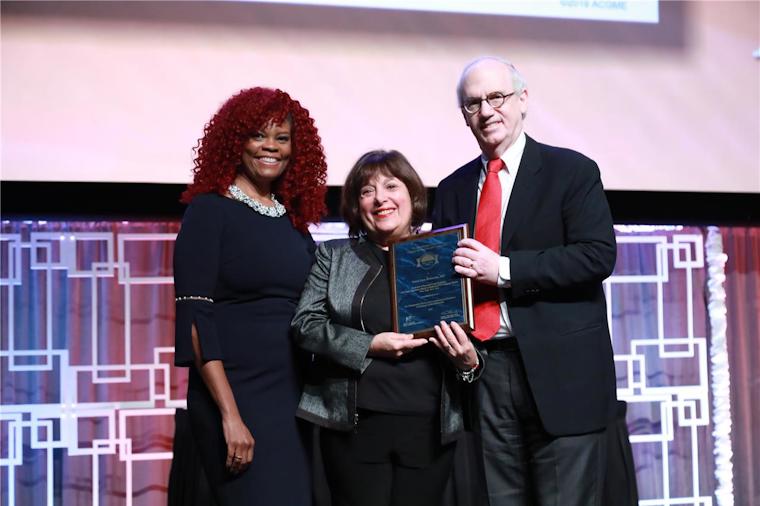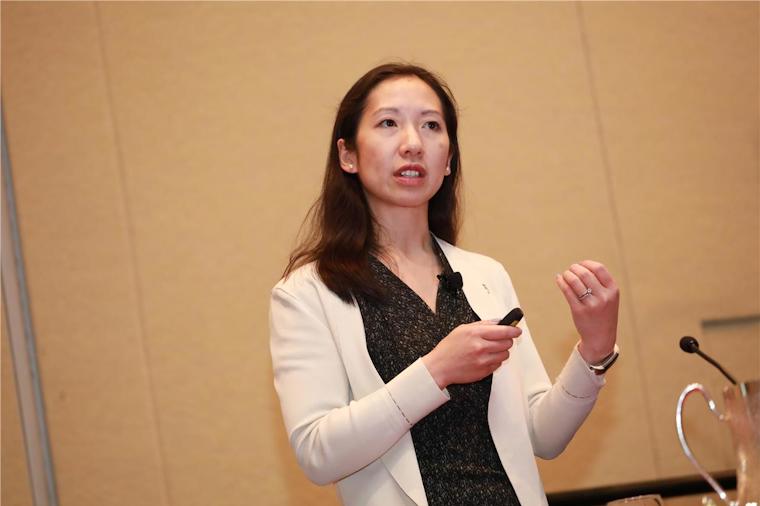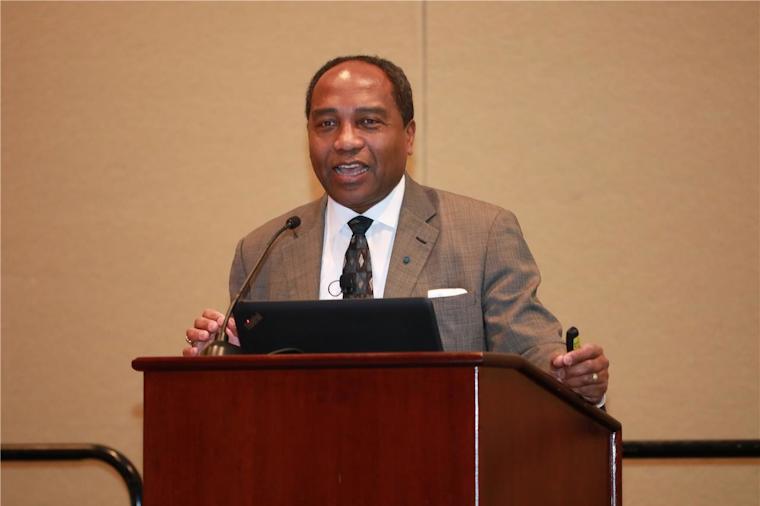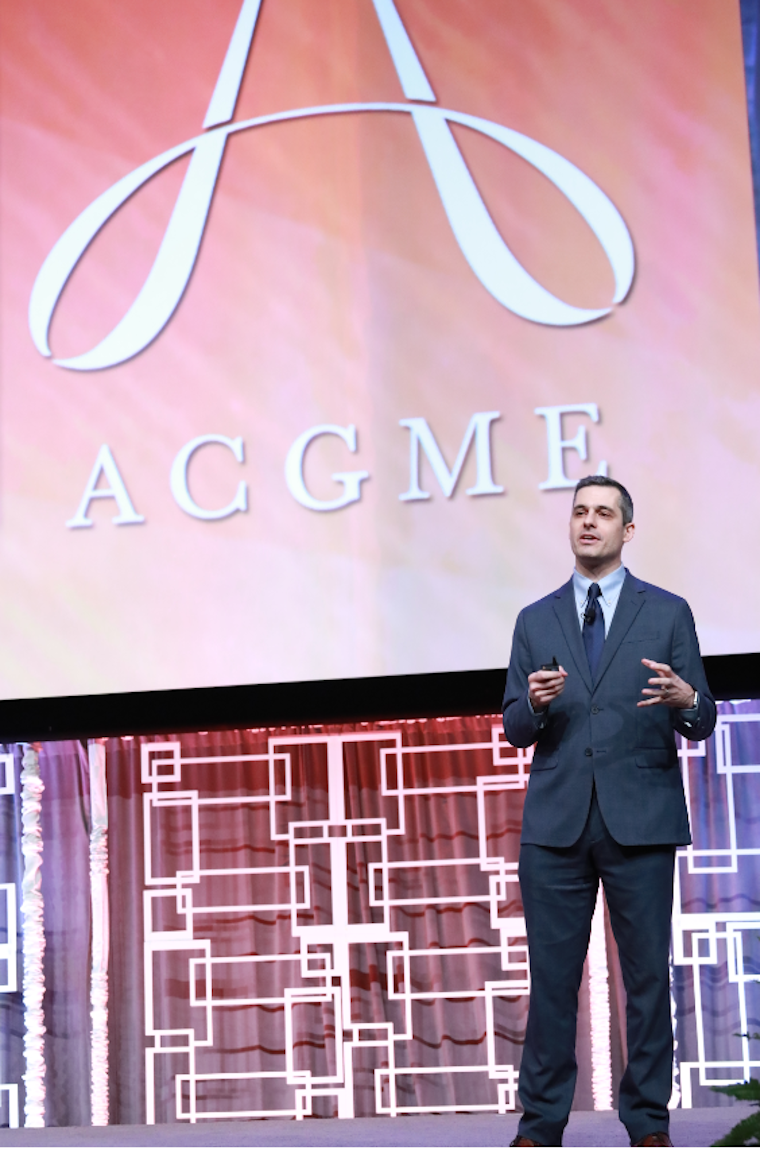On this first full day of the ACGME Annual Educational Conference, attendees were encouraged to “reignite the fire” of passion that drives them to work in graduate medical education, and to rediscover their meaning in medicine.
During the morning plenaries on this International Women’s Day, Dr. Carol Bernstein was awarded the John C. Gienapp Award for Distinguished Service for her longstanding commitment to graduate medical education and physician well-being. Dr. Bernstein is the first woman to receive this honor.
A few other highlights from throughout the day include…
NAM Action Collaborative on Clinician Well-Being and Resilience: Perspectives from the Leaders
Victor Dzau, MD, president of the National Academy of Medicine (NAM); Darrell G. Kirch, MD, president and CEO of the Association of American Medical Colleges, and Thomas J. Nasca, MD, MACP, president and CEO of the ACGME—co-chairs of the NAM Action Collaborative on Clinician Well-Being and Resilience—joined together for an intimate discussion about physician well-being.
The Collaborative, which includes more than 150 member organizations, promotes physician well-being and resilience, leveraging its members’ influence to create a healthier, safer medical community.
“We are all individually and collectively responsible for the environment in which we work,” Dr. Nasca said.
Part of that responsibility includes breaking the “culture of silence” surrounding clinician burnout. So, the trio shared their own personal experiences, some for the first time.
Dr. Kirch confessed he fell into a deep depression following a particularly grueling 12-week anatomy class in medical school. He credits his dean of student affairs, who not only assured him he would be okay, but who also worked with him to seek treatment for depression. For the first time publicly, Dr. Dzau shared how he left his initial residency program due to deep feelings of guilt, and what he now recognizes as burnout, after he was unable to make arrangements, while on an ICU rotation, to see his wife who had been admitted to the hospital. Dr. Nasca shared he has lost four residents, three medical students, and five colleagues to malignancy, violence, and suicide.
“More of us have to tell our stories,” Dr. Kirsch said.
Using Public Data to Follow GME Graduates into Clinical Practice
Marc M. Triola, MD and Patrick M. Cocks, MD, from the NYU School of Medicine explained how they are using large databases of publicly available information to help understand the patterns of health care practice and outcomes among graduates from programs once they have left the programs. While a great deal of educational data is gathered on individual physician behavior during medical school and residency, there is a steep drop-off in data gathered in clinical practice. Inversely, the amount information of attributable patient data and outcomes increases exponentially.
By using students’ resident information, and the graduates’ National Provider Identifier numbers—a public, unique 10-digit code used to identify health care providers—Drs. Cocks and Triola can tie the educational data and patient data together, tracking resident graduates’ clinical behaviors long after they complete their residencies and fellowships.
The information gathered from this aggregation of data can help identify patterns and generate hypotheses about the impact of resident/fellowship education on clinical practice long-term, Dr. Cocks said, with the goal of ultimately driving programmatic and curriculum changes to better serve patients.
Drs. Cocks and Triola created a website (link: https://iime.cloud/acgme) with descriptions and links to large databases of public information that programs and institutions can use to develop their own longitudinal research initiatives.
Addressing the Opioid Epidemic: The Responsibility of Physicians
With overdose as the leading cause of death for Americans under 50, it is imperative that the nation—including the entire medical community—take responsibility for its role in creating this epidemic and identify and enact strategies that can address it.
Dr. Leana Wen, MD, former Baltimore Health Commissioner and president of Planned Parenthood, spoke about the steps she and the City of Baltimore took to address opioid addiction in the community.
Dr. Wen outlined a three-tier call to action to stem the tide of deaths caused by overdoses and substance abuse disorder.
The first call to action was for physicians and institutions to create and stick to judicious prescribing guidelines. “I think of it as ‘start low and go slow’ and this will represent a change for practice,” she said.
The second was to increase access to on-demand, evidence-based treatment, using the “gold-standard” of treatments available. “It is critical that health professionals talk about this and we deal with addiction just like any other illnesses,” Dr. Wen Said.
The third call-to-action was to understand the intersection between substance abuse disorder and other issues.
NIDDK Initiatives to Eliminate Health Disparities and Train a Diverse Workforce
Griffin Rodgers, MD, MBA, MMSc, MACP, director of National Institute of Diabetes and Digestive and Kidney Diseases (NIDDK), presented NIDDK Initiatives to Eliminate Health Disparities and Train a Diverse Workforce. Dr. Rodgers explained that the three related issues of obesity, diabetes, and kidney diseases are responsible for staggering health care costs in the United States, particularly among minority populations.
He pointed out that anything we can do that has a positive effect on obesity rates among the population has positive effects on population health. He also detailed how the NIDDK spends substantial resources encouraging underrepresented minorities to choose a career in NIDDK mission areas. Dr. Rodgers was introduced by William McDade, Md, PhD, the newly appointed ACGME Chief Diversity and Inclusion Officer.
Throughout the afternoon, attendees went to sessions on a variety of topics, including specialty-specific updates, educating residents on social determinants of health, teaching and mentoring LGBTQ learners, and ACGME initiatives like the Milestones and the Clinical Learning Environment Review Program.
A private luncheon honored ACGME and ACGME International awardees, as well as two awards presented jointly by the ACGME with the Arnold P. Gold Foundation and the New York Academy of Medicine respectively.
A sunset session, “Successful Practices for Engaging Residents and Fellows in Patient Safety”, leveraged the expertise of peers and colleagues in the ACGME’s Pursuing Excellence in Clinical Learning Environments initiative who are working to create patient safety programs for residents.
Tomorrow morning will feature the Marvin R. Dunn Keynote as a fireside chat between Dr. Nasca and Dr. Vivek H. Murthy, 19th Surgeon General of the United States. Keep checking in for more updates and follow #ACGME2019 on Twitter.












